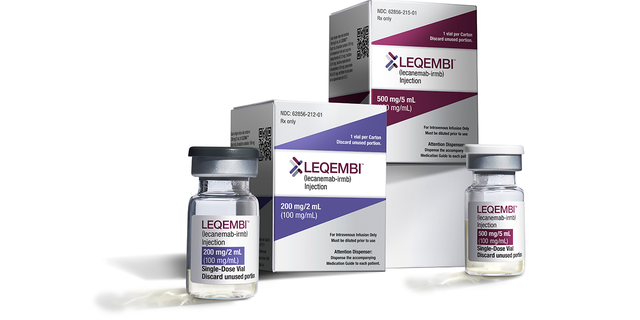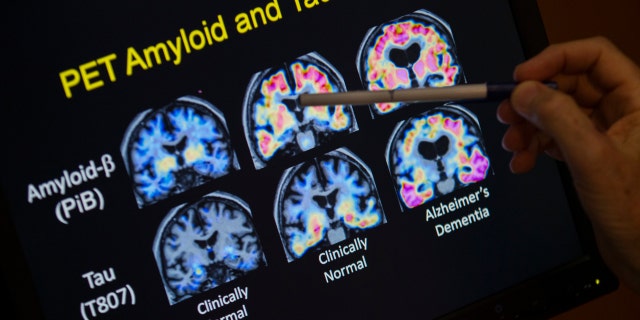Health
FDA fully approves ‘novel’ Alzheimer’s disease drug Leqembi, will be covered by Medicare

The Food and Drug Administration (FDA) has fully approved a “novel” drug used to treat adult patients with Alzheimer’s, the agency announced.
Leqembi, which is produced by Japanese drugmaker Eisai and American-based drugmaker Biogen, was initially approved in January under the Accelerated Approval pathway. After promising clinical trials, the drug was given traditional approval Thursday.
“Leqembi is the first amyloid beta-directed antibody to be converted from an accelerated approval to a traditional approval for the treatment of Alzheimer’s disease,” the FDA explained in a press release.
“The drug works by reducing amyloid plaques that form in the brain, a defining pathophysiological feature of the disease,” the statement added.
CARING FOR A LOVED ONE WITH ALZHEIMER’S DISEASE: MAINTAIN STRUCTURE AND FAMILARITY, EDUCATE YOURSELF AND MORE
The Food and Drug Administration (FDA) has approved a “novel” drug to treat adult patients with Alzheimer’s. (iStock)
Medicare administrator Chiquita Brooks-LaSure announced that the program will begin covering the drug, but Medicare patients will also be required to enroll in a registry to track its effectiveness.
“[Medicare] will cover this medication broadly while continuing to gather data that will help us understand how the drug works,” Brooks-LaSure said in a statement obtained by the Associated Press.
Clinical trials showed that the drug can slow the progression of Alzheimer’s disease by 27% for early-stage patients.
Alzheimer’s is a progressive, irreversible brain disorder that can destroy a patient’s memory and cognitive skills. The cause of the disease, which 6.5 million Americans have, is unknown.
BRAIN-BOOSTING FOODS FOR FIGHTING MEMORY LOSS, PREVENTING ALZHEIMER’S DISEASE

Leqembi, the first drug to show that it slows Alzheimer’s, was partially approved by the U.S. Food and Drug Administration in early January 2023.
“Today’s action is the first verification that a drug targeting the underlying disease process of Alzheimer’s disease has shown clinical benefit in this devastating disease,” Teresa Buracchio, acting director of the Office of Neuroscience in the FDA’s Center for Drug Evaluation and Research, said in a statement.
“This confirmatory study verified that it is a safe and effective treatment for patients with Alzheimer’s disease,” Buracchio added.
The FDA disclosed that patients who take anticoagulant medication, or blood thinners, are at increased risk of hemorrhages with Leqembi. Leqembi is also only approved for use by Alzheimer’s patients in the mild dementia or cognitive impairment stage of the disease.

A doctor points to PET scan results that are part of a study on Alzheimer’s disease at a hospital in Washington. (AP Newsroom)
“The labeling states that there are no safety or effectiveness data on initiating treatment at earlier or later stages of the disease than were studied,” the FDA added.

Health
Semaglutide Pills and Injections Vs. Drops: Experts Weigh In | Woman's World

Sign Up
Create a free account to access exclusive content, play games, solve puzzles, test your pop-culture knowledge and receive special offers.
Already have an account? Login
Use left and right arrow keys to navigate between menu items.
Use escape to exit the menu.
Health
Jennifer Hudson Lost 80-Lbs Without Depriving Herself—Learn Her Secrets

Sign Up
Create a free account to access exclusive content, play games, solve puzzles, test your pop-culture knowledge and receive special offers.
Already have an account? Login
Use left and right arrow keys to navigate between menu items.
Use escape to exit the menu.
Health
Kennedy’s Plan for the Drug Crisis: A Network of ‘Healing Farms’

Though Mr. Kennedy’s embrace of recovery farms may be novel, the concept stretches back almost a century. In 1935, the government opened the United States Narcotic Farm in Lexington, Ky., to research and treat addiction. Over the years, residents included Chet Baker and William S. Burroughs (who portrayed the institution in his novel, “Junkie: Confessions of an Unredeemed Drug Addict”). The program had high relapse rates and was tainted by drug experiments on human subjects. By 1975, as local treatment centers began to proliferate around the country, the program closed.
In America, therapeutic communities for addiction treatment became popular in the 1960s and ’70s. Some, like Synanon, became notorious for cultlike, abusive environments. There are now perhaps 3,000 worldwide, researchers estimate, including one that Mr. Kennedy has also praised — San Patrignano, an Italian program whose centerpiece is a highly regarded bakery, staffed by residents.
“If we do go down the road of large government-funded therapeutic communities, I’d want to see some oversight to ensure they live up to modern standards,” said Dr. Sabet, who is now president of the Foundation for Drug Policy Solutions. “We should get rid of the false dichotomy, too, between these approaches and medications, since we know they can work together for some people.”
Should Mr. Kennedy be confirmed, his authority to establish healing farms would be uncertain. Building federal treatment farms in “depressed rural areas,” as he said in his documentary, presumably on public land, would hit political and legal roadblocks. Fully legalizing and taxing cannabis to pay for the farms would require congressional action.
In the concluding moments of the documentary, Mr. Kennedy invoked Carl Jung, the Swiss psychiatrist whose views on spirituality influenced Alcoholics Anonymous. Dr. Jung, he said, felt that “people who believed in God got better faster and that their recovery was more durable and enduring than people who didn’t.”
-
/cdn.vox-cdn.com/uploads/chorus_asset/file/25822586/STK169_ZUCKERBERG_MAGA_STKS491_CVIRGINIA_A.jpg)
/cdn.vox-cdn.com/uploads/chorus_asset/file/25822586/STK169_ZUCKERBERG_MAGA_STKS491_CVIRGINIA_A.jpg) Technology1 week ago
Technology1 week agoMeta is highlighting a splintering global approach to online speech
-

 Science1 week ago
Science1 week agoMetro will offer free rides in L.A. through Sunday due to fires
-
/cdn.vox-cdn.com/uploads/chorus_asset/file/23935558/acastro_STK103__01.jpg)
/cdn.vox-cdn.com/uploads/chorus_asset/file/23935558/acastro_STK103__01.jpg) Technology1 week ago
Technology1 week agoAmazon Prime will shut down its clothing try-on program
-

 News1 week ago
News1 week agoMapping the Damage From the Palisades Fire
-
/cdn.vox-cdn.com/uploads/chorus_asset/file/25826211/lorealcellbioprint.jpg)
/cdn.vox-cdn.com/uploads/chorus_asset/file/25826211/lorealcellbioprint.jpg) Technology7 days ago
Technology7 days agoL’Oréal’s new skincare gadget told me I should try retinol
-
/cdn.vox-cdn.com/uploads/chorus_asset/file/25832751/2192581677.jpg)
/cdn.vox-cdn.com/uploads/chorus_asset/file/25832751/2192581677.jpg) Technology4 days ago
Technology4 days agoSuper Bowl LIX will stream for free on Tubi
-

 Business5 days ago
Business5 days agoWhy TikTok Users Are Downloading ‘Red Note,’ the Chinese App
-
/cdn.vox-cdn.com/uploads/chorus_asset/file/25835602/Switch_DonkeyKongCountryReturnsHD_scrn_19.png)
/cdn.vox-cdn.com/uploads/chorus_asset/file/25835602/Switch_DonkeyKongCountryReturnsHD_scrn_19.png) Technology2 days ago
Technology2 days agoNintendo omits original Donkey Kong Country Returns team from the remaster’s credits















